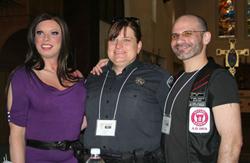The title — Victims’ Voices Matter — may be a downer but the conference was an upbeat and sometimes hilarious gathering that put queer realities into the laps of community members and police officers.
The two-day conference was put on by the Ottawa Police Service queer liaison committee and Ottawa’s queer community centre project. It covered a wide range of topics from reporting homophobic violence to letters from victims of hate crimes and workshops on queer terminology.
The conference began with a dinner and guest speaker Brett Parson, a larger-than-life officer from the Washington DC Police Gay Lesbian Liaison Unit (GLLU).
Parson spoke of the history of the GLLU. With an easy storytelling style, Parson began the conference by breaking down stereotypes — beginning with himself, a 6’2″, 200+ pound, balding and burly police officer who happens to be gay.
Parson was offbeat and humorous, a characteristic that carried through to the following day. In his workshop, Parson briefly introduced the audience to his training agenda, which is given to all police officers entering the Washington DC GLLU.
For Parson this was an easy audience, a mixture of queers and allies, but it was an opportunity to talk and introduce people to a small part of the queer world.
“Anytime you get a group of people together, no matter how they react to it, it’s positive. Just using the language and talking the talk is important, so you are always going to be in a winning situation,” says Parson.
It was not only Parson who drew laughter from the audience and encouraged questions but also Dee Dee Delight — who stepped up to the podium and wryly introduced herself before taking questions.
“I have been Princess of Pride twice — which means I didn’t win,” says Delight.
Delight answered questions from the audience that varied from issues of safety — “drunk straight boys and drag queens don’t mix” — to the differences between drag queens and cross dressers.
Christine Schulz, a transgender woman who has been with the Ottawa police for the last four years, spoke of the application process, the reaction of her colleagues and her role in the police force as a member of the queer community and a police officer.
Schulz recalled an incident where she was called by fellow police officers needing help. The officers were on a call that involved a transgendered person and didn’t know what to do, so they turned to Schulz.
“I went from Christine the police officer to Christine the community member who happens to be a police officer,” says Schulz. “I think that’s a very important distinction — I think you can’t forget where you have come from as a police officer.”
The conference was about building support and understanding between the queer community and police officers. Around 150 people attended with RMCP officers joining police from Hamilton, Cornwall, Peterborough and Waterloo.
This year was the third conference put on by the police liaison committee. Although the audience were mainly allies of the queer community, the conference generated discussions and broke down some barriers.
Marion Steele, one of the organizers and a member of the liaison committee, was happy with the turnout and hopeful of the outcome.
“My smallest hope would be that the next time they pull somebody over and realize that they might be dealing with a trans person that they treat them with that little bit of extra help, that they take another moment to think before they speak,” says Steele.

 Why you can trust Xtra
Why you can trust Xtra


